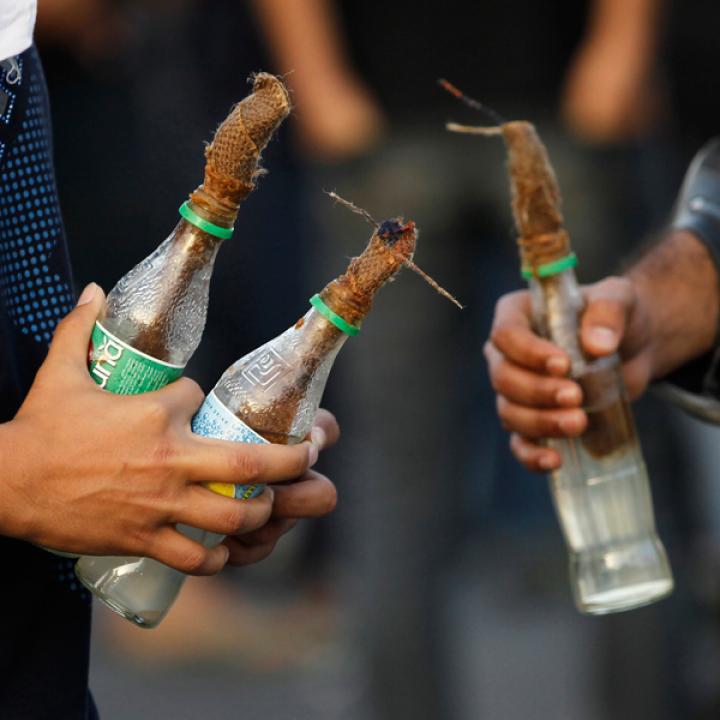

The Yemen intervention and other recent actions show how concerned the Gulf states are about the Iranian threat, though an even greater challenge may emerge from their severe tactics against domestic dissent.
The impending international nuclear agreement with Iran raises concern in the Arab Gulf monarchies about Iranian subversion. Riyadh and other Gulf capitals are concerned that an emboldened Iran might increase subversive activity in their own countries, especially in Bahrain. Former Saudi intelligence chief Turki al-Faisal al-Saud alluded to this in a March 16 BBC interview when he included Bahrain on a list of countries in which Iran is "already a disruptive player."
The new war in Yemen has exacerbated these fears. Four of Saudi Arabia's Gulf neighbors -- the United Arab Emirates (UAE), Bahrain, Kuwait, and Qatar -- along with five other countries have supported the kingdom in the military intervention that began on March 26. The Saudi-led airstrikes seek to dislodge the so-called Houthis (also known as Ansar Allah) from power. The Houthis have been supplied with weapons, money and expertise by Iran. Likewise, the Houthis' ascendancy in Yemen has increased Iranian influence there.
It remains unclear how Iran will respond to the new Saudi-led campaign. Until now, Yemen has not been a strategic priority for Tehran like Syria and Iraq. Iran may not want to pursue an expanded fight over Yemen in the immediate wake of an international nuclear deal.
Still, comments from Tehran don't assuage Gulf concerns. The head of Iran's parliamentary committee on national security and foreign policy, Alaeddin Boroujerdi, has warned that "the smoke of this fire will go into the eyes of Saudi Arabia." Parliamentarian Ali Reza Zakani has predicted that "the Yemeni revolution...will be extended...to Saudi territory and...the people of the Eastern Province of Saudi Arabia will lead those protests." Iran's Foreign Minister, Javad Zarif, issued the relatively mild statement that the Saudi offensive "will give no advantage to any country that involves itself in these actions." For their part, Houthi officials have threatened suicide operations inside Saudi Arabia, and warned that the kingdom's intervention in Yemen will be the end of the Saudi regime.
An important factor contributing to Gulf states' concern is experience and history. Iran's 1979 Islamic Revolution cast a long shadow across the Arab Gulf. The new regime in Tehran immediately declared the Gulf's ruling families illegitimate, and Iran has pursued a combination of hard and soft power tactics to undermine them. Kuwait and Bahrain were some of the first targets of violence in this regard; Iran-linked attempted coups and bombings in these countries began in the early 1980s. Iran-connected attacks in Saudi Arabia came later, in the late 1980s, and then again in 1996 against the Khobar Towers American residential compound. The 2012 cyberattack on Saudi oil company ARAMCO that crashed 30,000 computers was probably conducted with Iranian assistance. The post-Arab Spring environment has seen new soft power efforts from Iranian Arabic-language media to undermine the Bahraini and Saudi rulers.
The three countries that have been primary targets of Iranian subversive activity in the Gulf announced new security measures inside their countries on the first day of the Yemen strikes. Bahrain's prime minister, Prince Khalifa bin Salman al-Khalifa, directed government departments to "enhance their vigilance...to fortify the domestic front," while Bahrain's Interior Ministry warned against attempts to "exploit the situation through division or sedition."
Kuwait and Saudi Arabia both announced they were raising security levels around oil installations. Security had already been stepped up at these locations to protect against new terrorist threats linked to Islamic State gains in Iraq. Kuwait's Interior Ministry revealed it was monitoring the country's Yemeni community, some members of whom are Zaidis like the Houthis. The Kuwaiti National Guard declared it was prepared for any emergency. Kuwait also has been focused on security in preparation for the annual Syrian donors' conference there beginning March 31.
The UAE and Qatar -- the two other Gulf members of the anti-Houthi coalition -- have not been the target of violent subversive activity from Iran in the past. It seems unlikely Tehran would suddenly calculate that the benefits are now worth the risk. But the Emiratis especially view the security of the six Arab Gulf monarchies as interconnected. The UAE sent forces to Bahrain along with Saudi Arabia to crush the uprising there in 2011 -- a move heavily criticized by Iran.
The new threat environment carries consequences for Gulf states' internal security policies. For one, it will add fuel to the dangerous sectarian strategies pursued by a minority of Gulf capitals to guard against the threat. Second, it will strengthen the wider crackdowns on expression of dissent that have been building with vigor since the beginning of the Arab spring.
On the first day of the Yemen strikes, Bahrain arrested two leaders of the al-Wahdawi political society for a statement criticizing the military action by Bahrain and other countries in Yemen. The Justice, Islamic Affairs, and Endowment Ministry has said it will file a lawsuit to dissolve the group. Also, Bahrain's prosecutor-general has filed a new lawsuit against the country's most prominent Shiite opposition figure, Sheikh Ali Salman, for condemning the county's participation in the Saudi-led strikes. He is currently being detained on widely disputed charges from December 2014 of promoting the overthrow of the government by force.
To guard against the political chaos around them, and to prevent it from bleeding into their own societies, Gulf governments have penalized dissenters along with the terrorists. The greater challenge for the Gulf may be the fallout from these severe tactics.
Lori Plotkin Boghardt is a fellow in Gulf politics at The Washington Institute. This article originally appeared on Fikra Forum.
Fikra Forum



